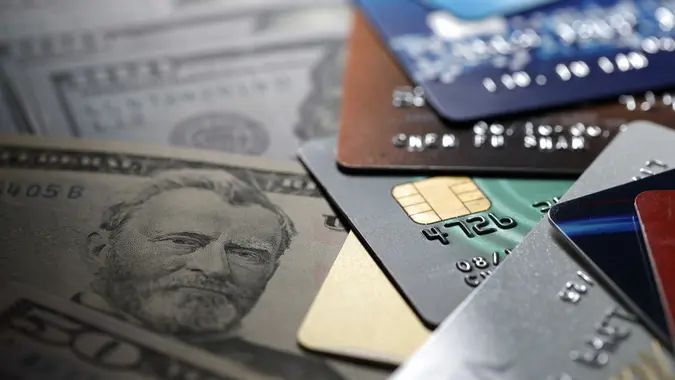3 Tips for College Students to Use Credit Cards Responsibly

Commitment to Our Readers
GOBankingRates' editorial team is committed to bringing you unbiased reviews and information. We use data-driven methodologies to evaluate financial products and services - our reviews and ratings are not influenced by advertisers. You can read more about our editorial guidelines and our products and services review methodology.

20 Years
Helping You Live Richer

Reviewed
by Experts

Trusted by
Millions of Readers
College is where you learn more than subjects in school; you learn the rules of life, including how to manage money. One major aspect of money management nowadays is understanding how to appropriately use your credit cards. And as a college student who is just learning personal responsibility, it can be a bit difficult to know exactly what to do to not ruin your credit right away.
So how can you learn to use your credit cards responsibly as a college student? Here are a few simple tips to consider …
1) Avoid Using Your Credit Card for Every Purchase
It may be tempting to whip out your credit card every time you see a new pair of jeans – or candy bar – you like. However, the idea of using your credit card is to make a few purchases to show that the card is active then pay it off immediately to show you handle your credit responsibly. If you rack up a huge bill then it will affect your available balance/limit ratio, which can essentially lower your credit score.
2) Only Buy What You Can Afford
Again, the idea of the credit card is not to satisfy your eyes, which are likely to be bigger than your wallet. If you can’t afford to pay an item off at the end of the billing cycle then you simply cannot afford it. If you make it a habit of using your credit card to make these types of purchases, you may find your account falling into the delinquent category, which will begin the process of damaging your credit.
3) Make More than the Minimum Payment
If you charge a $100 printer and realize that you can’t pay it off before the end of the month, some of the balance will carry over to the next month. Knowing that you have time to pay it off, you may be tempted to pay only the minimum balance so that you can keep some money in your pocket. This isn’t a good practice, because the longer you take to pay off your balance, the more interest you will rack up, in addition to having a lower available balance, which you definitely don’t want. So instead, give them what you can to help pay the balance off as soon as possible.
It’s not hard to manage credit cards as a college student if you take time to understand the repercussions of not doing so responsibly. You’re already learning tons of subjects in school, so take time to learn one more: credit management!
Learn how you can raise your credit score in 3 easy steps.
 Written by
Written by 

























